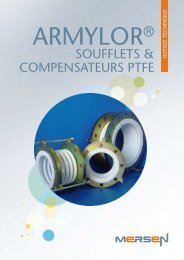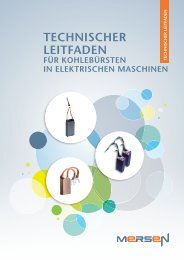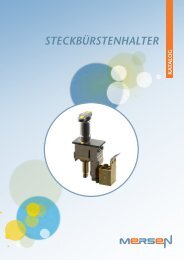siliconised graphite - for mechanical application - Mersen
siliconised graphite - for mechanical application - Mersen
siliconised graphite - for mechanical application - Mersen
Create successful ePaper yourself
Turn your PDF publications into a flip-book with our unique Google optimized e-Paper software.
Siliconised <strong>graphite</strong><br />
For <strong>mechanical</strong><br />
apPlication<br />
TECHNICAL GUIDE
Applications<br />
Siliconised<br />
<strong>for</strong><br />
Silicon carbide converted <strong>graphite</strong> has a wide range of <strong>application</strong>s, especially<br />
in areas with high friction or dry friction components or in working in very hard<br />
conditions:<br />
• Seal rings <strong>for</strong> <strong>mechanical</strong> seals<br />
• Mating rings in <strong>mechanical</strong> seals<br />
• High speed sealing<br />
• Heavy duty bearings<br />
• Valve seats <strong>for</strong> high temperature or with corrosive fluid<br />
The main + points of Siliconised Graphite<br />
+<br />
Hardness<br />
Surface hardness is close to that of solid silicon carbide. In the Mohs scale of hardness it is just between<br />
aluminium oxide and diamond. Microhardness measurements give the following minimum values:<br />
• Vickers: > 2 500<br />
• Rockwell B: ≥ 100<br />
100<br />
90<br />
Graphite<br />
10<br />
Tungsten<br />
carbide<br />
Alumina<br />
Silicon<br />
carbide<br />
Diamond<br />
80<br />
70<br />
60<br />
50<br />
40<br />
30<br />
20<br />
Solid<br />
silicon<br />
carbide<br />
Phenolic<br />
resin<br />
impregnated<br />
silicon<br />
carbide<br />
Siliconised<br />
<strong>graphite</strong><br />
5<br />
10<br />
0<br />
Compared hardness by ball penetration.<br />
0<br />
Mohs scale.<br />
+ Self lubrication capability<br />
The converted part of the piece contains a small percentage of non converted <strong>graphite</strong>. This lubricates the<br />
contact area and gives a lower friction rate. We have measured this rate and classified different materials<br />
combinations. The best per<strong>for</strong>mances were achieved with:<br />
• Resin impregnated hard carbon JP 545, against <strong>siliconised</strong> <strong>graphite</strong> mating ring.<br />
• Siliconised <strong>graphite</strong> against itself.<br />
0,1<br />
CW<br />
Tungsten<br />
carbide<br />
0,5<br />
SiC<br />
JP545<br />
<strong>graphite</strong><br />
AI 2 0 3<br />
Alumina<br />
0,15<br />
0,10<br />
SiC/SiC<br />
JP545/SiC<br />
JP 545/Alumina<br />
0,5<br />
Lubrificated friction in <strong>siliconised</strong> <strong>graphite</strong> counterface.<br />
2<br />
Dry friction.
3<br />
Graphite<br />
<strong>mechanical</strong> <strong>application</strong>s<br />
+<br />
+ Weight<br />
Its density is 1.9 to 2.0. It is less than steel (7.8), ceramics, and<br />
far less than tungsten carbide.<br />
Because of their hardness, it is difficult to machine ceramics or metal carbide items, diamond<br />
tooling being required. <strong>Mersen</strong> has developed a conversion process which is carried out<br />
after machining.<br />
We are able to supply within 0,1 mm tolerances (0.004 inch) without the need of finishing<br />
operations. For tighter tolerances grinding and lapping is necessary. Seal rings can be<br />
supplied with a 2 helium light band flatness.<br />
Our shops are fully equipped with the latest machine tools and we are able to offer items<br />
with complex shapes from small to large series at competitive prices.<br />
+ Temperature and thermal shock resistance<br />
A+0,1<br />
Possibility to supply complex shapes<br />
B + 0,05<br />
Silicon carbide and <strong>graphite</strong> are two refractory materials. In neutral or reducing atmospheres the maximum<br />
operating temperature is over 1,000°C (1,850°F). In an oxydising atmosphere, it is 450°C (840°F). However<br />
over this temperature the rate of oxidation is 10 times less than that of normal fine grain <strong>graphite</strong> without<br />
silicon carbide conversion. The converted outer part protecting the inner <strong>graphite</strong>. Note, <strong>for</strong> JPS 145 when<br />
imperviousness is obtained with resin impregnation the maximum temperature is 250°C (480°F).<br />
+ Thermal conductivity<br />
It is a little less than that of <strong>graphite</strong>s: 46W .m -1 .°C -1<br />
(2M BTU/ft.hr.°F). However it is enough to conduct the heat<br />
generated from the friction zone.<br />
+<br />
Abrasion resistance<br />
Because of its very high surface hardness, it is<br />
able to operate successfully even against the<br />
most abrasive counterfaces. It is also capable<br />
of working with fluids containing abrasive<br />
particles.<br />
+ Chemical inertness<br />
15<br />
10<br />
5<br />
0<br />
SiC<br />
Solid<br />
SiC<br />
Compared densities.<br />
Alumin<br />
Treated steel<br />
Tungsten<br />
carbide<br />
Both silicon carbide and <strong>graphite</strong> are unaffected by most of corrosive liquids and gases:<br />
acids, bases, solvents… A compatibility chart is available on request.<br />
Physical properties of Siliconised Graphite<br />
Apparent density<br />
Porosity<br />
Breaking strength • flexion<br />
• compression<br />
Surface hardness • Rockwell B<br />
• Vickers<br />
Coefficient of expansion between 20 et 200°C<br />
Thermal conductivity 20°C<br />
Temperature • oxydising atmosphere<br />
resistance • reducing atmosphere<br />
JPS 100 Standard<br />
1,90<br />
10 %<br />
45 MPa<br />
140 MPa<br />
> 100<br />
2 500<br />
4,0 µm . m . °C -1 -1<br />
46 W . m . °C -1 -1<br />
450°C<br />
1 800°C<br />
JPS 145 impervious<br />
1,90<br />
impervious at 6 bars<br />
70 MPa<br />
150 MPa<br />
> 100<br />
2 500<br />
4,0 µm . m . °C -1 -1<br />
46 W . m . °C -1 -1<br />
250°C<br />
250°C<br />
The in<strong>for</strong>mation contained in this brochure is given <strong>for</strong> in<strong>for</strong>mation purposes only, and does not commit <strong>Mersen</strong> in any way whatsoever. This document shall not be copied, reproduced or translated in whole or in part without <strong>Mersen</strong>’s<br />
written permission.<br />
Data herein contained are provided <strong>for</strong> general in<strong>for</strong>mation purpose only and are not binding. <strong>Mersen</strong> shall have no liability whatsoever with respect to in<strong>for</strong>mation contained herein. Duplication, reproduction or translation of any<br />
in<strong>for</strong>mation contained herein, in whole or in part, is strictly prohibited without prior written consent of <strong>Mersen</strong>.<br />
Our materials are in con<strong>for</strong>mity with the RoHS-Directive (Restriction of the use of certain Hazardous Substances in electrical and electronic equipment). Besides <strong>Mersen</strong> guarantees the <strong>application</strong> of the European Community<br />
REACH-Regulation (Registration, Evaluation, Authorization and Restriction of Chemical substances) to all its plants located in Europe.
Holytown, Scotland UK<br />
Chongqing, China<br />
St-Marys, USA<br />
Gennevilliers, France<br />
Main production sites<br />
industrial or commercial branch.<br />
A WORLD EXPERT<br />
in materials and solutions<br />
<strong>for</strong> high temperature processes<br />
Global expert in materials and solutions <strong>for</strong> extreme<br />
environments as well as in the safety and reliability<br />
of electrical equipment <strong>Mersen</strong> designs innovative<br />
solutions to address its clients specific<br />
A GLOBAL PLAYER<br />
needs to enable them to optimize their manufacturing<br />
process in sectors such as energy, transportation,<br />
electronics, chemical, pharmaceutical and progress<br />
industries.<br />
Contact <strong>for</strong> Europe<br />
MERSEN France Gennevilliers<br />
41 rue Jean Jaurès - BP 148<br />
F-92231 GENNEVILLIERS CEDEX<br />
FRANCE<br />
Tél: +33 (0) 1 41 85 45 17<br />
Fax: +33 (0) 1 41 85 43 06<br />
E-mail: turbograf@mersen.com<br />
HT51GB 1150<br />
www.mersen.com















